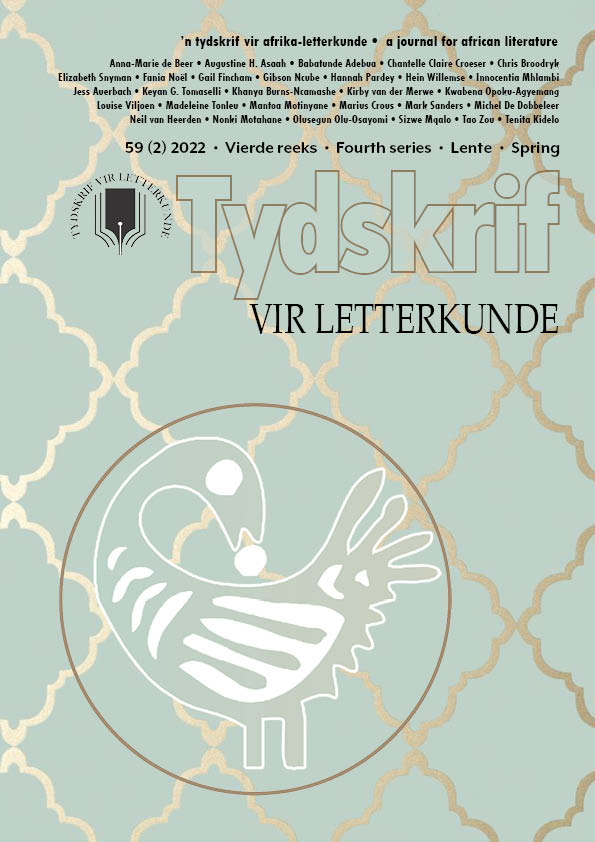Dans l’esprit du Dionysien : Le courrier des fans de Marlene van Niekerk à Freddy Mercury
DOI :
https://doi.org/10.17159/tl.v59i2.13422Mots-clés :
Apollon contre Dionysos, Kaar, Marlene van Niekerk, Friedrich NietzscheRésumé
Cet essai s’appuie sur la dichotomie de Nietzsche entre les principes apollinien et dionysiaque relatifs à la tragédie classique, pour l’analyse du poème « Fan mail Freddy Mercury » de Marlene van Niekerk, tiré de Kaar (2013). Le poème traite du musicien de rock Freddy Mercury et il illustre l’esprit dionysiaque à travers les mouvements de l’artiste, sa performance et son registre vocal. D’après ma lecture du texte, il est évident qu’il y avait une forte fusion de l’apollinien et du dionysiaque dans la vie et le travail de Freddy Mercury. Malgré son esprit rebelle et sa négation de la foi de son enfance, la culture lui a dicté d’être enterré dans sa foi. Van Niekerk ajoute une autre dimension au poème quand elle invoque Zarathoustra, la figure prophétique de Nietzsche, à distinguer du dieu historique de la foi de Zoroastre. Le langage métaphorique utilisé par la poète suggère son espièglerie dionysiaque.
Téléchargements
Références
Aiken, David. “Nietzsche and his Zarathustra: A Western Poet’s Transformation of an Eastern Priest and Prophet.” Zeitschrift für Religions- und Geistesgeschichte vol. 55, no. 4, 2003, pp. 335–53. DOI: https://doi.org/10.1163/157007303770479785.
Asbo, Kayleen. “The Lyre and the Drum: Dionysus and Apollo throughout Music History.” Mythological Studies Journal. 2011.
Ashouri, Daryoush. “Nietzsche and Persia.” Encyclopedia Iranica. 2010. https://www.iranicaonline.org/articles/nietzsche-and-persia#:~:text=As%20Nietzsche%20admits%20himself%2C%20by,same%20time%2C%20according%20to%20his.
Burger, Willie. “Also sprach Treppie: Taal en verhaal as muurpapier in Marlene van Niekerk se Triomf (of “It’s all in the mind”).” Literator vol. 21, no. 1, 2000, pp. 1–20. DOI: https://doi.org/10.4102/lit.v21i1.437.
Carlevale, John. “Dionysus Now. Dionysian Myth-History in the Sixties.” Arion: A Journal of Humanities and the Classics vol. 13, no. 2, 2005, pp. 77–116.
Chilton, Martin. “Mr. Bad Guy: Why Freddie Mercury’s Solo Album Was A Shot In The Arm”. udiscovermusic. 9 Apr. 2022. https://www.udiscovermusic.com/stories/freddie-mercury-mr-bad-guy-solo-album/.
Colyar, Brock. “Cruisin’ With the Mustache Crew Meet the Facial-Hair Style Taking Over Every Gay Bar In The City.” The Cut. 22 Apr. 2019. https://www.thecut.com/2019/04/cruisin-with-the-mustache-crew.html.
Cox, Christoph. “Nietzsche, Dionysus, and the Ontology of Music.” A Companion to Nietzsche, edited by K. A. Pearson. Blackwell, 2006, pp. 495–513. DOI: https://doi.org/10.1002/9780470751374.ch27.
Deleuze, Gilles. Nietzsche and philosophy. Continuum, 1983.
Freeman, Timothy J. “The Mask of Tragedy: An Impossible Book.” Klasnotas. U Hawaii.
Geli, Carles. “How Freddie Mercury and Montserrat Caballé made musical history.” 8 Okt. 2018. https://english.elpais.com/elpais/2018/10/08/inenglish/1538998793_523395.html.
Harris, John. “The sins of St Freddie.” The Guardian. 14 Jan. 2005.
https://www.theguardian.com/music/2005/jan/14/2.
Haueis, Philipp. “Apollinian Scientia Sexualis and Dionysian Ars Erotica? On the Relation Between Michel Foucault’s History of Sexuality and Friedrich Nietzsche’s Birth of Tragedy.” Journal of Nietzsche Studies vol. 43, no. 2, 2012, pp. 260–82. DOI: https://doi.org/10.5325/jnietstud.43.2.0260.
Heidegger, Martin “Who Is Nietzsche’s Zarathustra?” The Review of Metaphysics vol. 20, no. 3, 1967, pp. 4117–431.
Herbst, Christian T. et al. “Freddie Mercury—acoustic analysis of speaking fundamental frequency, vibrato, and subharmonics.” Logopedics Phoniatrics Vocology vol. 42, no. 1, 2017, pp. 29–38. DOI: https://doi.org/10.3109/14015439.2016.1156737.
Levine, Nick. “Who was the real Freddie Mercury?” BBC. 11 Okt. 2019. https://www.bbc.com/culture/article/20191010-who-was-the-real-freddie-mercury.
Mingren, Wu. “Ahura Mazda and Angra Mainyu In Zoroastrianism’s Creation Mythology.” Parsi Khabar.
Feb. 2021. https://parsikhabar.net/religion/ahura-mazda-and-angra-mainyu-in-zoroastrianisms-creation-mythology/24856/.
Nel, Marius. “Zoroastranisme en die ontstaan van apokaliptiese denke.” HTS Teologiese studies vol 59, no. 4, pp. 1425–42. DOI: https://doi.org/10.4102/hts.v59i4.702.
Nietzsche, Friedrich. The Project Gutenberg eBook of The Birth of Tragedy, vertaal deur William A. Hausmann, geredigeer deur Oscar Levy. Project Gutenberg, 2016. https://www.gutenberg.org/files/51356/51356-h/51356-h.htm#.
Nietzsche, Friedrich. The Project Gutenberg eBook of The Case Of Wagner, Nietzsche Contra Wagner, and Selected Aphorisms by Friedrich Nietzsche, geredigeer deur Anthony M. Ludovici. Project Gutenberg, 2008. https://www.gutenberg.org/files/25012/25012-h/25012-h.html.
Nietzsche, Friedrich. Thus Spoke Zarathustra. A Book for Everyone and No One, vertaal deur R. J. Hollingdale. Penguin, 1961.
Paglia, Camille. Sex, Art and American Culture. Viking, 1993.
Paglia, Camille. Sexual Personae. Penguin, 1990.
Pappas, Nickolas. “Nietzsche’s Apollo.” Journal of Nietzsche Studies vol. 45, no. 1, 2014, pp. 43–53.
Pieterse, H. J. “Variasie en variëteit: ’n Voorlopige verkenning van die voorkoms en funksie van taalvariëteite in Kaar (Marlene van Niekerk).” Tydskrif vir Geestes¬weten¬skappe vol. 57, no. 2–1, 2017, pp. 369–86. DOI: http://dx.doi.org/10.17159/2224-7912/2017/v57n2-1a9.
Porter, James. I. “Nietzsche, Tragedy, and the Theory of Catharsis.” SKENÈ Journal of Theatre and Drama Studies vol. 2, 2016, pp. 201–28. https://doi.org/10.13136/sjtds.v2i1.45.
Rossman, Jean. “Dionysian Daydreaming: (Re) Creating Community in Marlene van Niekerk’s Memorandum.” English in Africa vol. 41, no. 3, 2014, pp. 57–78. DOI: https://doi.org/10.4314/eia.v41i3.3s.
Schnabel, Tom. “Apollonian v. Dionysian Music Experience.” KCRW. 1 Aug. 2011. https://www.kcrw.com/music/articles/apollonian-v-dionysian-music-experience.
Snyman, Henning. “LitNet Akademies-resensie-essay: Kaar ’n klein ensiklopedie van woord en digkuns.” LitNet Akademies. 4 Des. 2013. https://www.litnet.co.za/litnet-akademies-resensie-essay-kaar-n-klein-ensiklopedie-van-woord-en-digkuns.
Stern, J. P. Nietzsche. Fontana, 1985.
Songfacts. “Radio Ga Ga”. Songfacts. https://www.songfacts.com/facts/queen/radio-ga-ga.
Ulusoy, Emre. “Subcultural Escapades via Music Consumption: Identity Transformations and Extraordinary Experiences in Dionysian Music Subcultures.” Journal of Business Research vol. 69, no. 1, 2016, pp. 244–54. DOI: https://doi.org/10.1016/j.jbusres.2015.07.037.
Van Niekerk, Marlene. “Die aard en belang van die literêre vormgewing in ‘Also sprach Zarathustra’ deur Friedrich Wilhelm Nietzsche.” MA-tesis. U Stellenbosch, 1978. https://scholar.sun.ac.za/handle/10019.1/64421.
Van Niekerk, Marlene. Kaar. Human & Rousseau, 2013.
Wikipedia-bydraers. “Freddie Mercury.” Wikipedia, The Free Encyclopedia.
Téléchargements
Publiée
Numéro
Rubrique
Licence
(c) Copyright Tydskrif vir Letterkunde 2022

Ce travail est disponible sous licence Creative Commons Attribution - Partage dans les Mêmes Conditions 4.0 International.


 https://orcid.org/0000-0001-6465-6584
https://orcid.org/0000-0001-6465-6584


.png)